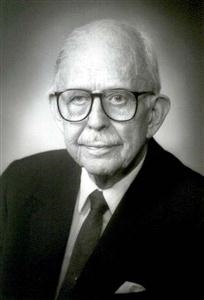A. Sherman Christensen
A. Sherman Christensen was a trial attorney and the first federal district judge in Utah who was a member of The Church of Jesus Christ of Latter-day Saints.
He was also an author and published six books, volumes of poetry, and many legal articles, as well as an autobiography.
Federal Judge Willis Ritter presided as chief judge at the time of his service and seemed to do everything in his power to make life difficult for Christensen. In the preface to Latter Day Lawyers, by Brian Craig, former Senator Harry Reid described Ritter as “a nemesis of nearly everyone and every institution.” Ritter’s reputation was well-earned and he did everything in his power to make life miserable for Christensen.[1]
Christensen persisted in being the best judge he could be and eventually took early retirement due to the tension with Ritter.
Christensen was born on June 9, 1905, in Manti, Utah. As a boy, he worked as a clerk in his father’s law office. He studied at Brigham Young University until 1927. He worked first as a file clerk for the U.S. War Department. While assisting the chancellor of the law school at National University (now George Washington University), the chancellor offered Christensen a scholarship to attend the university’s law school. He received a Bachelor of Laws degree in 1931, then joined his father’s firm in Provo, Utah. He worked as a trial lawyer from 1932 to 1942. From 1942 to 1945, Christensen served in the U.S. Navy during World War II, then returned to private practice in Provo from 1945 to 1954.
On May 12, 1954, U.S. president Dwight D. Eisenhower nominated Christensen to a new seat on the United States District Court for the District of Utah. He received his commission on May 28, 1954. In 1968, he received his Juris Doctor degree from George Washington University Law School. He assumed senior status (a form of semi-retirement for U.S. federal judges) on August 17, 1971.
The year after attaining senior judge status in the early `70s he was also appointed to the Temporary Emergency Court of Appeals, where he eventually served longer than any of the other 27 judges who had served since its beginning. His judicial service, in addition to the hearing of cases on trial and appellate levels throughout the country, included membership in six committees of the Judicial Conference of the United States.
In 1975, Christensen became an adjunct professor of law at the University of Utah. From 1975 to 1977 he was an adjunct professor at the J. Reuben Clark Law School at BYU, where he taught trial practice.
According to Wikipedia, “Teaching trial practice law, a growing conviction that students and new lawyers did not have enough training in trial practice, and the urging of Chief Justice Warren Burger spurred Christensen, along with J. Reuben Clark Law School Dean Rex Lee and Chief Justice Burger, to experiment with the British Inns of Court system to try to create an American equivalent. A pilot program was tested at BYU, and in the fall of 1979 a draft for an Inn of Court was created. In 1980, Christensen was one of the founders of the first American Inn of Court in the Provo/Salt Lake City area of Utah.[1] The American Inn met for the first time in February 1980 in Provo. With the success of the first American Inn of Court, a second was established in 1981 by University of Utah Students. In the fall 1983, Chief Justice Burger created a Committee of the Judicial Conference of the United States on the American Inns of Court. Christensen was named the chair, and remained in that position until July 1984, when he resigned due to the deteriorating health of his wife. He received the 1989 Chairman's Award for his contributions to the American Inns of Court movement. The award was renamed in his honor that year and the A. Sherman Christensen Award is presented yearly to a member of the American Inns of Court who demonstrates distinguished, exceptional, and significant leadership.”[2]
In 1989 he sat with two distinguished British judges at the mock trial for treason of George Washington in the ancient hall of Lincoln's Inn in London, the trial being broadcast live by the BBC.
Christensen served as a settlement judge in Salt Lake City, Utah, until 1992. He died on August 13, 1996, in Provo, Utah. He and his wife, Lois Bowen, who preceded him in death, had three children.
During his lifetime, he was honored with many awards and distinctions. In total, Christensen wrote over 200 court opinions. Eighty-five of these were reviewed on appeal with eighteen being reversed, seven affirmed with qualifications, and sixty affirmed without qualification.
